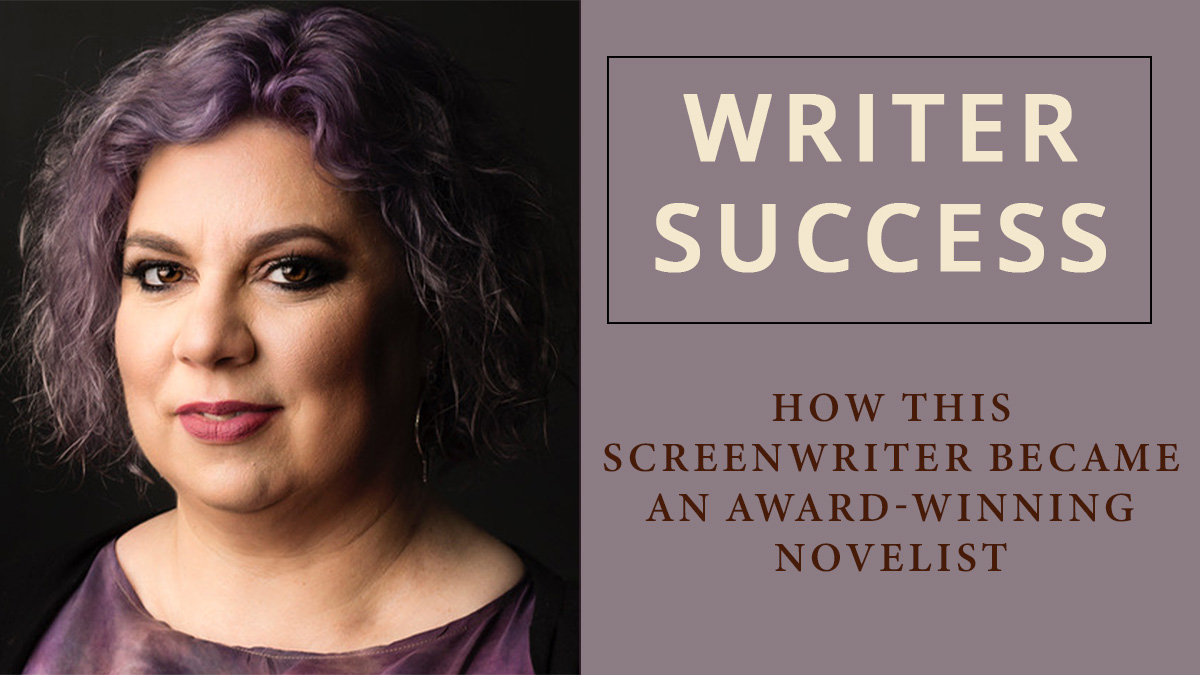
Screenwriters and novelists have a lot more in common than you think. And not just because film adaptations of fiction and non-fiction short stories and novels are on the rise. The craft involved in writing a compelling book is similar to writing a screenplay that sells. At least, that’s been the experience for 2016 Launch Pad Prose Top Comedy winner, Juliet McDaniel.
Learn how Juliet launched her screenwriting career with her manuscript Mr. and Mrs. American Pie, and how the right exposure, a competition win, and a strong fiction writing background can add up to screenwriting success.
Juliet McDaniel’s project Mr. and Mrs. American Pie won the “Top Comedy” accolade in the 2016 Launch Pad Manuscript Competition. After being discovered through the competition, it was adapted into a television show, Palm Royale, starring Kristin Wiig, Josh Lucas, and Lauren Dern, and premiered on AppleTV in March 2024!
Have a piece of writing you want to share? Submit to our Launch Pad Prose Writing Competition.
Should you write a screenplay or a novel?
“I was a screenwriter way before I was a novelist. [Novels] were an accidental thing,” Juliet said. But lucky or not, Juliet acknowledged that her strong fiction writing background had a role in her screenwriting success. “I have an MFA in writing from DePaul,” Juliet said. “It was a brand new program. There were three areas of concentration and I did all three … and I ended up using all three.”
Julie taught writing, worked in marketing and was spending her free time writing screenplays — which landed her four options and one produced film, QWERTY (2012). So the path forward was a mixture of a lot of different, but complementary writing skills.
Taking the first step
Today, Juliet is working with award-winning actor Laura Dern and Platform Media to bring her manuscript to television. Juliet relishes working with such smart women.
“[Laura] is smart as hell. Hearing her talk about a script and getting things from the actor’s perspective is really interesting. You can tell this is a person who has read thousands of screenplays.”
With quarantine slowing down many productions and sales, Juliet is still waiting to hear back on her draft on the pilot and if she’ll be in the room. But she’s grateful and excited for the opportunity, whatever the outcome may be.
The difference between screenplays and novels
One of the hardest shifts for Juliet was mastering the difference between books and scripts. Writing a book that’s meant to be read and a screenplay that’s ultimately destined to be seen turned out to be quite a task. “My first draft of Mr. and Mrs. American Pie was 125 pages. All dialogue,” Juliet laughed. She had been writing scripts for so long that writing prose was a completely different animal.
“If I’m writing a manuscript, I can do so much more playing around with the form without turning off the audience right away. If I’m writing a novel, I am the actor, the director, and the writer, and I need to make sure that I am helping the audience be in that character’s head the whole time.”
How to write a great manuscript
Having been a professional reader in the industry, Juliet knows what judges are looking for and had some advice for people submitting both manuscripts and screenplays:
“At the very least, know your form. Don’t think you can write a comedy if all you read are action films. Have a beginning middle and end. Don’t sit down thinking you’re going to sell something that reinvents the whole concept of screenwriting.”
“And don’t worry about what’s commercial. Save that for your second draft. Especially for prose.”
But her biggest piece of advice for writers is simple. In fact, you’ve probably heard it a thousand times before. “Just write every day. And if you get stuck, come up with something else.”
How to be a screenwriter outside of L.A.
One of the most common questions from aspiring screenwriters is can you be a screenwriter and live somewhere other than Los Angeles? If there is one thing the stay-at-home orders have revealed to the industry, it’s that it’s time to embrace remote work! Juliet is proof that you can be a screenwriter just about anywhere.
“I live in Chicago and I can’t really go to L.A. without having a job in place.” Being a young mom who was working hard to put herself through school at DePaul, moving to Los Angeles just wasn’t an option. Now, because she placed in the Launch Pad Manuscript Competition, Juliet is working with Laura Dern and well-known Los Angeles producers to turn her manuscript into a pilot.
She decided to enter the competition after winning a “3-pack of entries” for Feature, Pilot, and Manuscript Competitions. She applied for the manuscript competition and still has yet to use the other two as she’s been busy at work writing another novel.
Find your writing community
Whether you’re isolated at home in a pandemic, or out of the house and trying to make your way in the industry, you need a community to lean on. Even though Juliet was based in Chicago, the independent film scene proved a big resource for her and other up-and-coming artists in film and the commercial world.
“I was lucky enough that in Chicago in the indie film scene that we would share each other’s work. It’s grown so much. Especially with women, it was a really tight-knit group.”
Juliet mentioned that even in Chicago there are Harvey Weinstein-types, and the women in film would lean on each other for support. “Reading each other’s work, encouraging each other, trying to get each other work — which was already hard, especially for women who are the crew.”
Collaboration is key
Sometimes these contacts would end up creating together, which is what Juliet did with Alexandria Frenkel when they produced the sketch video “Raven’s Lace.” The pair had heard of a fairly sexist advertising campaign for a hard liquor that was weaker in alcohol content, specifically so women could drink it.
Finding this laughable, Juliet quickly wrote up a sketch mocking the idea, with Frankel directing, and help from women they met over the years. “I love the women in it because they’re such a great example of Chicago’s comedy and improv scene.”
How to become a working writer
While also having a community, confidence in yourself is key. For Juliet, finding confidence in stressful or high-pressure situations can be tough. So she has created a character to push herself through. “[Maxine] was something that I cooked up that I would always pretend to be when I was in an uncomfortable situation. I always had this over the top, overly confident, boisterous, rich bitch basically in my mind. Part Dorothy Parker and part Alexis Carrington.” This character ultimately inspired Juliet so much that she was the basis for the protagonist in her winning manuscript entry.
Now that Juliet has landed representation from UTA and Zero Gravity Management, she’s onto the next stories she’s dying to tell.
“Write every day which, believe me, is easier said than done. I sat down today to write for my minimum required two-hour writing period and I ended up going to Spotify and building a playlist, but now I’m going to be up two hours past my bedtime, getting my two hours in.”
The desire Juliet had as a young kid to write hasn’t left her, no matter what was going on around her, and that’s not going to change now.
Submit your novel or short story to Launch Pad’s Prose competition to see if your story has what it takes to be adapted for the big screen.



